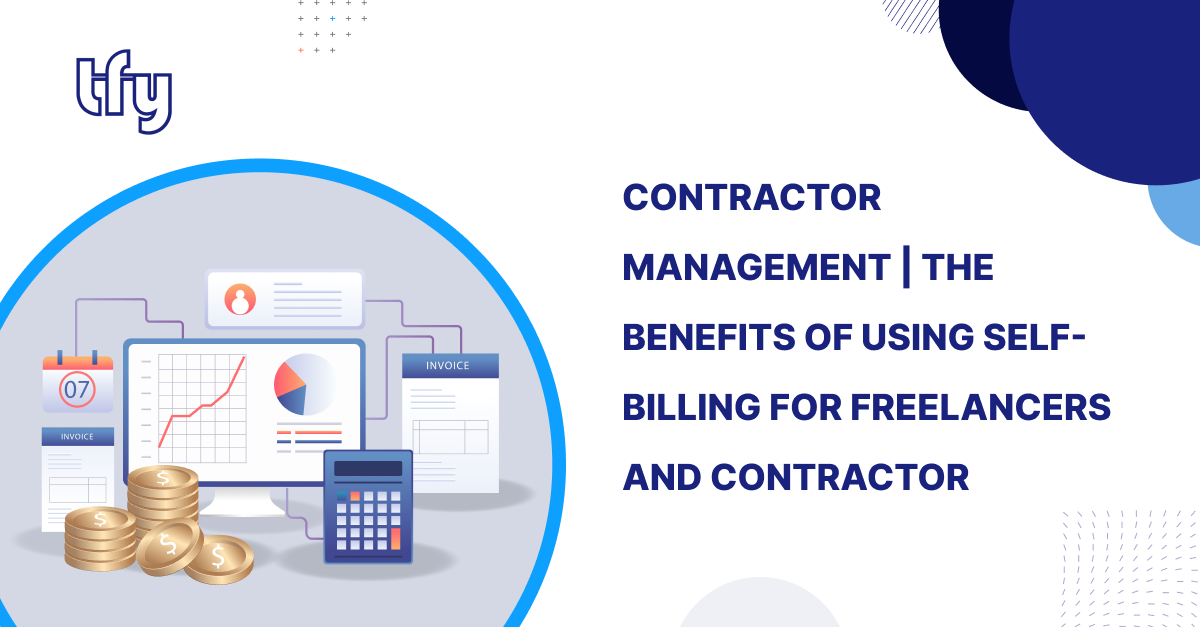
The dynamic work environment of today has made contractor management an essential component of many firms. The availability of specialized talents, cost effectiveness, and legal compliance all depend on good contractor management. Self-billing is one creative way to make this process run more smoothly. There are several advantages to this arrangement for both contractors and freelancers, as well as for the businesses that employ them. The benefits of self-billing and how it can change contractor management will be discussed in this article, with an emphasis on key components and recommended procedures. We will also explore associated subjects like outsourcing, contractor management software, and the difficulties in overseeing independent contractors.
What is Self-Billing
In a self-billing financial agreement, the freelancer or contractor creates bills on behalf of the client. An official agreement between the contractor and the client to expedite the billing process is known as a self-billing agreement. The corporation prepares and issues the bills, outlining the services done and the amount owed, rather than waiting for contractors to submit their invoices. This technique can greatly improve the billing process's accuracy and efficiency.
Benefits of Self-Billing for Contractors and Freelancers
Reduced Administrative Work
Administrative duties take a lot of time because an independent contractor frequently manages several projects and clients. Contractors can concentrate more on their primary duties by preparing and maintaining invoices in a much shorter amount of time when they self-bill.
Precise and On-Time Payments
By reducing the possibility of human error, self-billing guarantees accurate bills. This accuracy leads to timely payments, which is crucial for maintaining a healthy cash flow.
Compliance and Risk Mitigation
Self-billing agreements minimize the possibility of fines by ensuring adherence to tax laws. Self-billing facilitates the appropriate record-keeping of VAT bills for contractors who are registered with VAT.
Cost Savings
For both contractors and clients, self-billing can result in significant cost savings by lowering the administrative load and minimizing errors. Contractors save money on administrative expenses while businesses gain from simpler procedures.
Enhanced Contractor Management
Using contract management systems to implement self-billing enhances overall good contractor management. These systems provide features such as automated workflows, audit trails, and effective management of independent contractors.
Global Contractor Management
For businesses working with international contractors, self-billing simplifies the payment process across different currencies and tax regulations, making it easier to manage global contractors. This system also streamlines the way you pay contractors, especially when dealing with international payments.
Better Financial Planning
Accurate invoicing and regular payment cycles allow contractors and enterprises to better manage their finances, which improves project success rates.
Transparency and Trust
Self-billing encourages open communication between contractors and clients. Accurate and transparent billing fosters professional connections and increases confidence.
Reduced Disputes
Accurate and timely invoices reduce the likelihood of payment disputes, ensuring smooth and continuous operations.
Efficient Management Systems
Incorporating self-billing into contractor management software allows for efficient management of billing processes, reducing the time and effort spent on administrative tasks. A self billing arrangement can streamline the billing process and ensure compliance with VAT requirements, especially when working with an agency and setting up a company for VAT-registered businesses.
Scalability
Self-billing systems are scalable, making it easier for businesses to manage a growing contingent workforce and a larger number of independent contractors.
Contractor Management Software and Its Benefits
Contractor management software plays a pivotal role in implementing self-billing systems. These tools help manage independent contractors by tracking their work, scheduling tasks, and ensuring timely payments. Key features of contractor management systems include automated workflows, invoicing, compliance tracking, and performance reviews.
Streamlined Payment Process
Contractor management software simplifies the payment process, reducing the time spent on administrative tasks. It ensures that payments are made accurately and on time, improving the overall efficiency of contractor management.
Enhanced Compliance and Risk Mitigation
These systems help businesses comply with legal and tax regulations by maintaining accurate records and generating compliant invoices. They also mitigate risks associated with human error by automating the billing and payment processes.
Cost Savings
Implementing contractor management software can lead to significant cost savings. By automating administrative tasks and reducing errors, businesses can save on labor costs and avoid costly mistakes.
Improved Contractor Relationships
Using a contractor management system can improve relationships with independent contractors by ensuring good contractor management through transparent and timely payments. This fosters a positive working environment and enhances contractor satisfaction.
Implementing Self-Billing in Contractor Management Software
To fully leverage the benefits of self-billing, businesses should consider integrating this feature into their contractor management software. Here are some specific features and functionalities to look for:
Automated Workflows
The effective development and approval of self-billing invoices depends on automated operations. With the use of this capability, the programme may create bills automatically based on the tasks that contractors accomplish. Usually, the contractor logs their hours or deliverables into the system, and then the programme creates an invoice automatically based on pre-established terms and fees. Managers or other specified approvers can digitally evaluate and approve the generated invoice after it has gone through an approval workflow. Following approval, the contractor is informed, and the specified terms of payment are followed to start the payment process. Businesses may ensure that invoices are processed swiftly, cut down on human error, and save a lot of time by automating these stages.
Audit Trails
Keeping thorough audit trails is necessary for both compliance and auditing. A historical record of the series of actions influencing a particular activity or occurrence is provided by an audit trail. Every billing transaction—from creation to payment—is tracked, including user actions, modifications, and timestamps. These documents lower the possibility of fines by demonstrating compliance with tax laws and financial rules during regulatory audits, providing a clear history for dispute settlement, and helping to verify compliance with internal policies and external regulations.
International Payments
Managing payments to foreign contractors can be challenging since different countries have different tax laws and currencies. This process can be made simpler by contractor management software that has strong international payment capabilities. This software can handle payments in multiple currencies and convert sums automatically depending on current exchange rates. By implementing the appropriate tax rates and rules for each nation, it guarantees adherence to local tax laws. It is now simpler to pay contractors wherever they may be thanks to the software's support for a number of international payment options. Businesses can establish favorable relationships by expediting the payment process and guaranteeing overseas contractors receive their payments on time.
Risk Mitigation
When handling contractor payments, especially in a self-billing system, financial risk mitigation is essential. Through automated workflows and validations, the software lowers the possibility of human mistake in billing and payments while carrying out automatic checks to guarantee compliance with national and international tax rules and regulations. Preventing fraudulent activity and unauthorized access is made easier by putting security measures in place such as access limits and multi-factor authentication. The programme is updated in response to modifications to tax rules and regulations, guaranteeing continued adherence and lowering the possibility of fines.
Payment Terms Management
To guarantee accurate and on-time payments, it is crucial to precisely define and manage the terms of payment. With this function, payment arrangements are established in accordance with contracts with contractors. When payment deadlines draw near, the programme automatically notifies the company and contractors, making sure that everyone is informed of the impending deadlines. It can assist enforce payment discipline by automatically calculating late fees or interest for past-due payments. The programme ensures that each contractor's payment requirements are followed by allowing for adjustable payment terms to accommodate various contractor agreements.
Businesses can successfully deploy self-billing and increase productivity, compliance, and contractor satisfaction by adding these features to their contractor management software.
Challenges and Solutions in Implementing Self-Billing
Although self-billing has many benefits, there are drawbacks as well. These could include the price of the initial setup, the requirement for reliable accounting software, and making sure that every contractor is on board with the new system. In order to overcome these obstacles, businesses should make an investment in dependable self-billing software, train their accounting personnel, and have open lines of communication with their contractors regarding the advantages and protocols of self-billing.
Best Practices for Effective Self-Billing
To maximize the benefits of self-billing, companies should follow these best practices:
Choose the Right Software
Invest in comprehensive self-billing software that integrates with your existing financial systems.
Clear Agreements
To avoid misunderstandings and disagreements, make sure that all terms and conditions are spelt out in contracts with independent contractors and freelancers.
Regular Audits
Conduct routine audits to confirm that self-billing procedures are accurate and compliant, and that they adhere to legal requirements.
Effective Communication
Maintain open communication channels with contractors to address any concerns or issues promptly.
In Conclusion, Self-billing is a powerful tool in contractor management, offering numerous benefits for both freelancers and contractors as well as the companies that hire them. By improving cash flow, enhancing accuracy, and streamlining administrative processes, self-billing can transform the way businesses manage their contractor relationships. Implementing this system effectively requires careful planning and the right tools, but the rewards are well worth the effort.



